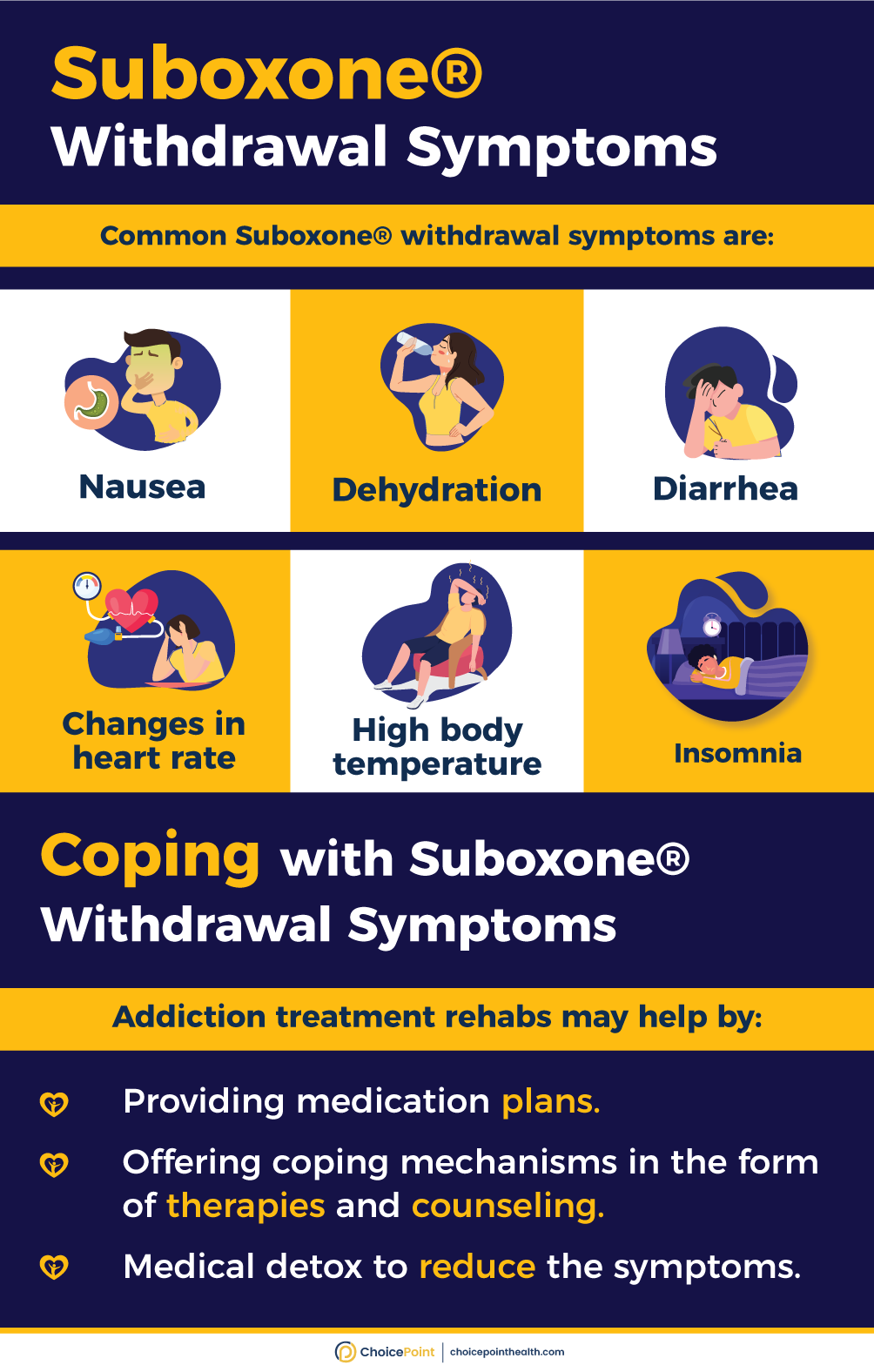Suboxone®, an effective treatment for opioid use disorder, can result in suboxone withdrawal symptoms if not administered under the proper guidance of addiction specialists. Therefore, if you are looking for a safe Suboxone withdrawal and want to learn about the stages of Suboxone withdrawal symptoms, then read the article, as we can help!
Table of Contents
Suboxone Withdrawal Symptoms – Why Do They Occur?
Suboxone® (Buprenorphine® and Naloxone®) is used to treat opiate dependence. However, Suboxone® may be addictive while still being effective as a form of treatment. Suboxone withdrawal is a way for the body to display the effects of using a medication for a long time.
Here is why some patients may experience Suboxone withdrawal symptoms after they stop taking it:
- Quitting Suboxone® after forming an addiction, the entire body may experience a chemical imbalance.
- The body is trying to recover and adjust itself
- A person stopped taking Suboxone® abruptly or going “cold turkey.”
- Suboxone® was abused and not administered under a doctor’s supervision
ChoicePoint is co-occurring addiction treatment center where DEA-certified addiction specialists can help you to gradually taper the dose of Suboxone® to avoid Suboxone withdrawal symptoms.
FAST FACT: Suboxone withdrawal symptoms are less severe than Methadone®. However, they may require urgent care. Suboxone withdrawal symptoms may be best managed at an addiction treatment rehab, where specialized staff is available 24/7.
Struggling With Suboxone Withdrawal Symptoms?- 5 Ways To Deal With Them!
Suboxone® should neither be taken nor stopped without the proper consultation with a doctor. Either could have drastic effects on one’s health.
“Many patients struggling with addiction may go back to taking heroin or fentanyl® or other Opioid after taking Suboxone®. The problem remains the same: lack of awareness among patients and psychiatrists about the management of withdrawal symptoms of Suboxone.”- says Jordyn Mastrodomenico, Addiction Specialist at ChoicePoint.
Read ahead to learn some ways that may help you to manage the discomfort and difficulties associated with Suboxone withdrawal:
1. Tapering the Dose Slowly
Your doctor may taper the dose slowly at an addiction treatment facility so your body can adjust naturally. Suboxone® taper periods often run between one week and 28 days. Depending on the patient’s condition, a doctor may reduce the dosage by 15 to 20 percent every week. Hence, the slow tapering of the dose may result in reduced discomfort and lower chances of a relapse.
2. Medical Detox
A medical detox program may help by offering round-the-clock medical and clinical care to make the Suboxone withdrawal process more comfortable and lower the chance of a relapse.
3. Counseling and Therapies
The main goal of these counseling and therapy sessions during Suboxone withdrawal treatment is to help a person to gain perspective and confidence to cope with the struggles. Counselors and therapists help people to identify negative behaviors and how to bring about positive change.
4. Healthy Lifestyle
A healthy lifestyle does wonders for your mind and body while dealing with Suboxone withdrawal symptoms. Here are some tips:
- Eat fresh fruits to soothe your cravings
- Take lots of fluids as it will help to expel Suboxone® out of your body
- Drink herbal tea often
- Exercise to boost your endorphins
- Interact with your friends and reach out for support
- Distract your mind from cravings by pursuing hobbies like reading or painting.
5. Getting Dual Diagnosis Treatment
Developing mental illness along with addiction is common. A dual diagnosis treatment treats both diseases concurrently to help long-term addicts who also deal with mental health disorders.
Medical Detox can kick-start the recovery process. Contact ChoicePoint at 844.445.2563 and discuss your needs with our experienced staff about your needs now!

Dealing with Suboxone® Withdrawal
How Long Does Suboxone Withdrawal Last? – A Timeline
Did you know some patients try to detox their bodies from Suboxone® at home by going cold turkey? Suboxone withdrawal is a multi-stage procedure that demands urgent medical care. As it depends on the dosage and how long a patient takes Suboxone®. ChoicePoint, an addiction treatment rehab, offers a closely supervised setting for Detox from Suboxone®, as everyone’s experience with Suboxone withdrawal will vary in severity and duration.
The Suboxone withdrawal timeline is as follows:
First 24 Hours of Suboxone Withdrawal
The first physical effects may appear 6 to 12 hours after the last dose of Suboxone. The earliest symptoms include:
- Feeling like coming down with a cold
- Fatigue
- Nausea
- Diarrhea
- General discomfort in the body
Day 3 of Suboxone Withdrawal
Suboxone withdrawal symptoms may worsen on the third day, and one may feel the following.
- Knots in the stomach
- Hot/cold flashes
- No appetite
Day 7 of Suboxone Withdrawal
At this point, along with the physical Suboxone withdrawal symptoms like pain in the joints, certain psychological symptoms will start to appear:
- Insomnia
- Irritability
- Hallucinations
2 Weeks of Suboxone Withdrawal
By now, the symptoms will start to reduce, and you will:
- Feel like yourself again
- Anxiety
- Depression
Suboxone withdrawal symptoms are an indication of dependency on a substance. Contact ChoicePoint today at 844.445.2563 if you or a close one is battling suboxone withdrawal symptoms, and schedule an in-person or virtual appointment now!
Detox, Addiction Treatment, and Sustainable Recovery – ChoicePoint Provides It All
Whether you are considering Suboxone® as a form of Opioid Use Disorder treatment or want help dealing with Suboxone withdrawal symptoms, our DEA-certified doctors at ChoicePoint are here to help you.
At ChoicePoint, we offer the following addiction treatment programs:
- Telehealth Addiction Treatment Program
- Medication-Assisted Addiction Treatment Program
- Intensive Outpatient Addiction Treatment Program
- Outpatient Addiction Treatment Program
- Detox Addiction Treatment Program
- Dual Diagnosis Addiction Treatment Program
Did you know that only doctors with a licensed Opioid Treatment Program can prescribe Suboxone® (Buprenorphine®) to treat opioid use disorder? Our doctors at ChoicePoint are DEA-certified and may provide same-day Suboxone prescriptions, keeping your requirements in consideration.
Medical Disclaimer:
ChoicePoint aims to improve the quality of life for people struggling with substance use disorder and mental health issues. Our team of licensed medical professionals research, edit and review the content before publishing. However, this information is not intended to be a substitute for professional medical advice, diagnosis, or treatment. For medical advice please consult your physicians or ChoicePoint's qualified staff.










Review How to Safely Deal with Suboxone Withdrawal Symptoms?.